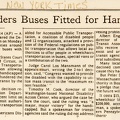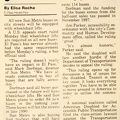Page 8-A EXPRESS-NEWS, San Antonio, Texas, Tuesday, February 14, 1939
[Headline] Federal court order could have impact on VIA budget
Complied from Staff and Wire Reports
INSERTED QUOTE:
“ The impact of the majority‘s decision will be very substantial throughout the country and will interfere with the local decision-making authority. I feel the court is overreaching."
- Judge Morton Greenberg
PHILADELPHIA — A court order Monday requiring the US Department of Transportation to require transit authorities to equip new buses with wheelchair lifts could have a significant impact on the budget of San Antonio's VIA Metropolitan Transit.
Attorneys who brought the lawsuit that led to the ruling called it the most important decision ever handed down for handicapped people needing public transportation.
Carol Ketcherside, assistant for governmental affairs to VIA manager Wayne Cook, said the wheelchair lifts add at least $15,000 to the cost of a new bus. The average life-time of a VIA bus is 12 years, she said, and when the expense is spread across a fleet of 500 buses, the cost for lifts "would be significant."
The $15,000 cost does not include the cost for maintaining the lifts or for refitting bus stops to make them accessible, she said. All bus stops being built by VIA currently are accessible, however.
The 3rd U.S. Circuit Court of Appeals said Monday a Transportation Department regulation requiring all new buses to accommodate wheelchairs conflicts with another allowing communities to offer only an alternative service, such as special vans to the handicapped, which VIA offers.
The court said a rule requiring reservations 24 hours in advance for use of the alternative transportation hinders the spontaneous use of mass transit by the handicapped. As a result, the court ordered transit authorities to make "reasonable accommodations to their programs, i.e. purchase wheelchair-accessible buses."
The court also upheld a controversial decision requiring the Transportation Department to eliminate a cap on the amount of money transit authorities need to spend on making transportation accessible.
A federal judge ordered VIA in 1985 to upgrade its services for the handicapped following a class action suit brought in 1983. The bus company's response was to create VIAtrans, a fleet of specially equipped vans that provide service to the handicapped who give advance notice.
Ketcherside also said VIA already spends more than the 3 percent maximum the Transportation Department can require for its accessibility programs.
"We far exceed the requirements of the federal government" she said. She said VIA will have to wait to see whether the Transportation Department will appeal the ruling or issue new regulations in accordance with the appeals court order to determine how it will affect the transit company.
A coalition of disabled people and 12 organizations called Americans Disabled for Accessible Public Transportation (ADAPT) filed the lawsuit last year that led to the appeals court decision.
ADAPT contended that a provision of the federal regulations allowed authorities receiving federal transportation funds to exclude the handicapped from "effective and meaningful" access.
The provision allows transit authorities to decide among three types of handicapped-accessible transportation: accessible buses, vans for the handicapped, or combination of the two.
U.S. District Judge Marvin Katz overturned the provision in cases where the transit authority buys any buses. He also overturned a regulation requiring authorities to spend no more than 3 percent -- of their average annual operating budget on transportation for the handicapped.
Katz called the limit arbitrary and said it allowed transit agencies "to eviscerate the civil right" to transit service that Congress mandated for the handicapped.
Circuit Judge Carol Las Mansmann in writing the 2-1 opinion also cited Congress' intent.
"Congress wanted to provide the disabled with the capability to utilize mass transit to the 'maximum extent feasible.' The DOT has failed to show that requiring the future purchase of accessible buses oversteps this legislative intent." Mansmann wrote.
In a dissenting opinion, Judge Morton Greenberg said the section requiring new buses to be accessible was not meant to apply to transit systems choosing paratransit system, such as special vans.
He also [said] the 3 percent cap was not arbitrary.
“ The impact of the majority‘s decision will be very substantial throughout the country and will interfere with the local decision-making authority," Greenberg wrote, "I feel the court is overreaching."
Timothy Gold [Cook] who argued the case before the court, said the ruling was “a major, major victory for the handicapped community ... we can't say enough positve things about it."
Gold [Cook], who is now director of the Washington-based National Disability Action Center, said he hoped the ruling would not be appealed in light of President Bush's recent comments about wanting to bring the handicapped into the mainstream."
- Created on
- Friday 12 July 2013
- Posted on
- Wednesday 22 July 2015
- Tags
- 24 hour advanced reservation, 3% cap, 3rd US Circuit Court of Appeals, ADAPT, bus stops, buses, cost, DOT, DOT regulations, handicapped, National Disability Action Center, paratransit, Philadelphia, San Antonio, Tim Cook, VIA, Wayne Cook, wheelchair lifts
- Albums
- Visits
- 4152
- Rating score
- no rate
- Rate this photo


0 comments